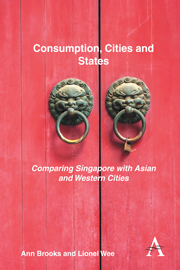Book contents
- Frontmatter
- Contents
- Acknowledgments
- Introduction
- Chapter 1 Consumption, Reflexivity and Citizenship in Global Cities
- Chapter 2 Orders of Reflexivity
- Chapter 3 Rescaling for Competitiveness
- Chapter 4 The Dynamics of State–Society Negotiations
- Chapter 5 (De-)Regulating Asian Identities: Comparing Asian Cities and States
- Chapter 6 Citizenship, Reflexivity and the State: Investigating ‘Defensive Engagement’ in a City-State
- Chapter 7 Governing the Citizen-Consumer: Citizenship, Casinos and ‘Cathedrals of Consumption’
- Chapter 8 Regulating Consumption and the ‘Pink Dollar’
- Chapter 9 States as ‘Midwives’ to Cities: Cosmopolitanism, Citizenship and Consumption in the Modern State
- References
- Index
Chapter 9 - States as ‘Midwives’ to Cities: Cosmopolitanism, Citizenship and Consumption in the Modern State
Published online by Cambridge University Press: 05 September 2014
- Frontmatter
- Contents
- Acknowledgments
- Introduction
- Chapter 1 Consumption, Reflexivity and Citizenship in Global Cities
- Chapter 2 Orders of Reflexivity
- Chapter 3 Rescaling for Competitiveness
- Chapter 4 The Dynamics of State–Society Negotiations
- Chapter 5 (De-)Regulating Asian Identities: Comparing Asian Cities and States
- Chapter 6 Citizenship, Reflexivity and the State: Investigating ‘Defensive Engagement’ in a City-State
- Chapter 7 Governing the Citizen-Consumer: Citizenship, Casinos and ‘Cathedrals of Consumption’
- Chapter 8 Regulating Consumption and the ‘Pink Dollar’
- Chapter 9 States as ‘Midwives’ to Cities: Cosmopolitanism, Citizenship and Consumption in the Modern State
- References
- Index
Summary
Introduction
In this concluding chapter, we consider more generally the relationship between states and cities – not just global cities. Our discussion brings together the themes of cosmopolitanism, citizenship and consumption that have been the organizing rubrics in the preceding chapters, and highlights at least one important way that the state continues to function as an important ‘midwife’ to globalization (as per Sassen's remarks; see Chapter 1). As different cities attempt to establish their own identities in ways that make them attractive not just to their own residents but to potential future residents and investments, it becomes useful to ask just what kinds of roles states can or should play in facilitating these goals. In this way, our concluding discussion fills an important gap in current debates in urban studies concerning the roles played by cities, creative classes and dispersion models (Florida 2005; Kotkin 2010; Sassen 2001a, 2001b), which have not given sufficient attention to the dialectical relationship between cities and states.
As we have already noted, Singapore is fortunate in that, as a city-state, the state faces relatively fewer problems in being a ‘midwife’ to the city, at least where problems of scale are concerned. But more often than not this is clearly not the case, and states and cities are not generally coterminous. Therefore, by placing our discussion of Singapore in a comparative perspective with data from other cities, a more nuanced appreciation of the relationship between cities and states emerges.
- Type
- Chapter
- Information
- Consumption, Cities and StatesComparing Singapore with Asian and Western Cities, pp. 153 - 172Publisher: Anthem PressPrint publication year: 2014

